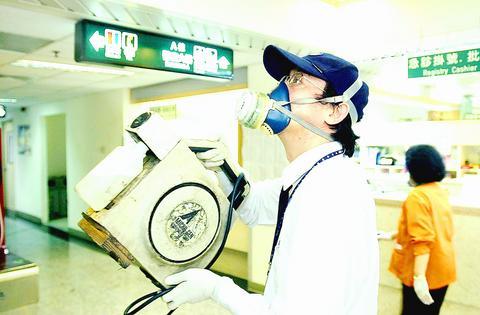The Department of Health (DOH) yesterday reported the first mass infection of severe acute respiratory syndrome, or SARS, after seven staff members at Taipei Municipal Hoping Hospital came down with symptoms of the disease.
An intern at the hospital was also thought to have contracted the disease.
"The seven hospital staff who came down with the disease include a doctor, two nurses, two laundry workers, an administrator and an X-ray technician," said Lee Lung-teng (李龍騰), deputy director-general of the DOH.

PHOTO: SEAN CHAO, TAIPEI TIMES
Two patients at the hospital are also suspected of having contracted the disease.
Yesterday evening, Yang Ker-ping (
She said the school would be closed for 10 days.
The DOH said a task force had been formed to trace the origin of the infection, which was discovered at around midnight on Tuesday.
Lee, however, said that the mass infection at the hospital was different from community spread of SARS. The DOH has imposed quarantine measures on the staff and their relatives, Lee said.
The DOH is investigating whether a 37-year-old male patient in the hospital could be the index patient in the latest infections.
"The patient was first diagnosed with cellulitis and later developed pneumonia. However, his contact history and travel history show no links to SARS cases," Lee said.
The patient has been transferred to National Taiwan University Hospital. Lee said the patient's long-term drug addiction had led to the weakening of his immune system.
"Therefore, his coughing and fever symptoms were not very obvious," he said.
Lee said the doctor tending to him was infected perhaps because it was difficult to detect the patient's SARS-like symptoms among his other ailments.
The other patient thought to have been infected with SARS at the hospital was an 82-year-old man.
"He was admitted to the same ward as the first patient. But when he was sent to the hospital, he did not have pneumonia," he said.
Lee said six out of the nine cases at the hospital had been listed as probable SARS cases.
After these cases were reported, the DOH and Taipei City's Health Bureau formed a joint team consisting of clinical experts, epidemiologists and health officials to investigate the mass infection.
Wu Kang-wen (
When asked whether the hospital's two laundry workers were infected when washing the patients' bed sheets or clothing, Wu said no clear explanation was available yet.
"We are still investigating the transmission routes of the infection," Wu said.
The DOH has imposed stringent measures to curb further spread of SARS in the hospital.
The measures include an overall disinfection of the hospital building and the suspension of the hospital's emergency services.
Chiou Shu-ti (
"The patients already staying in the hospital will not be moved. But their health conditions need to be tracked for two weeks after they are discharged," Chiou said.
"The hospital will not receive new inpatients for two weeks. Whether the period should be extended depends on whether the hospital's outbreak can be contained," she said.

The Central Election Commission has amended election and recall regulations to require elected office candidates to provide proof that they have no Chinese citizenship, a Cabinet report said. The commission on Oct. 29 last year revised the Measures for the Permission of Family-based Residence, Long-term Residence and Settlement of People from the Mainland Area in the Taiwan Area (大陸地區人民在台灣地區依親居留長期居留或定居許可辦法), the Executive Yuan said in a report it submitted to the legislature for review. The revision requires Chinese citizens applying for permanent residency to submit notarial documents showing that they have lost their Chinese household record and have renounced — or have never

A magnitude 5.6 earthquake struck off the coast of Yilan County at 12:37pm today, with clear shaking felt across much of northern Taiwan. There were no immediate reports of damage. The epicenter of the quake was 16.9km east-southeast of Yilan County Hall offshore at a depth of 66.8km, Central Weather Administration (CWA) data showed. The maximum intensity registered at a 4 in Yilan County’s Nanao Township (南澳) on Taiwan’s seven-tier scale. Other parts of Yilan, as well as certain areas of Hualien County, Taipei, New Taipei City, Taoyuan, Hsinchu County, Taichung and Miaoli County, recorded intensities of 3. Residents of Yilan County and Taipei received

Taiwan has secured another breakthrough in fruit exports, with jujubes, dragon fruit and lychees approved for shipment to the EU, the Ministry of Agriculture said yesterday. The Animal and Plant Health Inspection Agency on Thursday received formal notification of the approval from the EU, the ministry said, adding that the decision was expected to expand Taiwanese fruit producers’ access to high-end European markets. Taiwan exported 126 tonnes of lychees last year, valued at US$1.48 million, with Japan accounting for 102 tonnes. Other export destinations included New Zealand, Hong Kong, the US and Australia, ministry data showed. Jujube exports totaled 103 tonnes, valued at

BIG SPENDERS: Foreign investors bought the most Taiwan equities since 2005, signaling confidence that an AI boom would continue to benefit chipmakers Taiwan Semiconductor Manufacturing Co’s (TSMC, 台積電) market capitalization swelled to US$2 trillion for the first time following a 4.25 percent rally in its American depositary receipts (ADR) overnight, putting the world’s biggest contract chipmaker sixth on the list of the world’s biggest companies by market capitalization, just behind Amazon.com Inc. The site CompaniesMarketcap.com ranked TSMC ahead of Saudi Aramco and Meta Platforms Inc. The Taiwanese company’s ADRs on Tuesday surged to US$385.75 on the New York Stock Exchange, as strong demand for artificial intelligence (AI) applications led to chip supply constraints and boost revenue growth to record-breaking levels. Each TSMC ADR represents